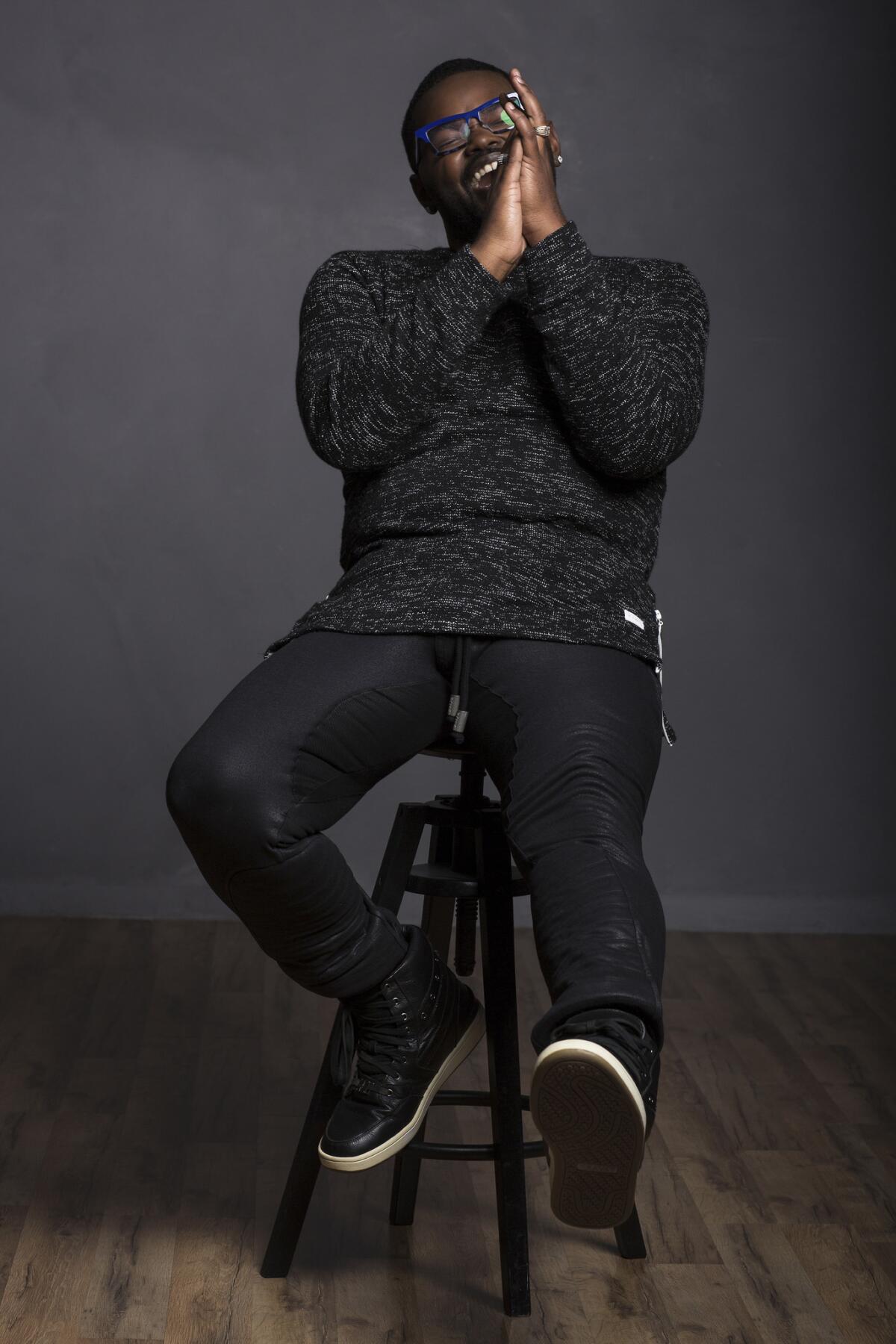John Holiday, the man singing Bernstein with the highest of high voices in Disney Hall
- Share via
Listening to a man singing like a female soprano can make some people uneasy. But the ears quickly adjust when the voice is John Holiday's.
At age 33, Holiday is considered one of the finest countertenors — the highest male part in opera — of his generation. In 2014 his musicality and immediate connection with the audience were palpable at Plácido Domingo's international Operalia competition, where he took third prize. The same year he played the mischievous Sorceress in Barrie Kosky's production of "Dido and Aeneas" at Los Angeles Opera, where Domingo is general director.
On Thursday, Holiday makes his debut in Walt Disney Concert Hall with Gustavo Dudamel leading the Los Angeles Philharmonic in Leonard Bernstein's "Chichester Psalms."
In this edited conversation, Holiday speaks about the countertenor voice, growing up in a suburb of Houston and why Bernstein's "Chichester Psalms" is a special piece for him.
Was the unexpectedness highness of your vocal range something you had to deal with growing up in Rosenberg, Texas?
I remember being made fun of because I sing really high — because I sang, as they would say, “like a girl.” It is kind of shocking, but we've had Michael Jackson, Frankie Valli, Frankie Lymon, the Fantasticks. These are people who sang in the range. They may not be singing classically, but they're also countertenors.
I remember not letting any of that stop me. I don't ever remember crying because somebody made fun of me. Whatever was said must have given me fuel for the fire that was already inside me.
It's common in the African American community to hear male soprano voices in church and not think anything of it. I remind people I'm doing the same thing but using a different lens for the classical idiom.
In "Dido and Aeneas," director Barrie Kosky made use of your large and powerful stage presence but also asked you to stretch a bit as the nasty Sorceress.
I had to be so mean, and it's totally not me. I'm really a good guy. But I wanted to go there. At first, trying to figure out how to do the role, my mantra was, “What would Meryl Streep do?”

Did you have role models?
I had an affinity for countertenor Andreas Scholl, and then I heard the voice of Derek Lee Ragin. I hadn't encountered another African American countertenor. It was great he looked like me, and he sounded like everything I wanted to sound like. I wanted to learn how to be as good a musician, singer and human being as he was. I wanted to hold up the mantle.
Tell us why "Chichester Psalms" is important, especially for you.
It was the piece that took me to Carnegie Hall in 2012. I first sang it with Robert Spano and the Atlanta Symphony. The text I sing in Hebrew comes from Psalm 23, Verses 1 through 6: "The Lord is my shepherd … ." It's the voice of the little boy David from the Bible. I love the music because of the beauty of the harmonies and the truth and authenticity with which Bernstein wrote the score.
Even connoisseurs argue over the true countertenor's range. What does being a countertenor mean to you?
It's basically a male singing in the vocal range of a mezzo or soprano. Countertenors adapt their voices to fit the repertoire. In 2015, I sang the role of Julius Caesar in Vivaldi's "Catone in Utica," which was very high but fit my voice well. Along the way, you figure out what works for you.
What recent roles have engaged you the most?
John Blue in "We Shall Not Be Moved." We just did the production with Bill T. Jones at the Dutch National Opera in Amsterdam. It's so strong and poignant, a jazz-opera hybrid, which is something I already do.
I also feel an extraordinary connection to Handel's Xerxes, in the regality of the role and how he's this tortured creature. I don't feel tortured, but I love that part of him as a multifaceted person. Through his madness and rage, and the horror he inflicts on people, he's looking to be loved. Every human being, even the bigot in our community — the bigot wants to be loved too. Everyone is searching to be loved.
At what point did you discover your voice?
I've always known I could sing, but didn't know where it would take me. I was lucky to be born into a family where music was highly valued. Education, eating well and music. My grandmother was a musician for church and an educator. I remember being the only child singing in the adult choir in church.
Does singing gospel make you unique among countertenors?
As Leontyne Price would say, “It's my roots.” What makes my voice different is that, other than classical, I also sing lots of jazz and gospel. It's not a party trick. It's really a part of my life. I love people so much. I love the connection and feeling of joy when I encounter other people listening to music. There is no love like the love you get from an audience. It's a beautiful thing.
♦ ♦ ♦ ♦ ♦ ♦ ♦ ♦ ♦ ♦
‘Dudamel Conducts Beethoven 9 & Bernstein’
Where: Walt Disney Concert Hall, 111 S. Grand Ave., L.A.
When: 8 p.m. Thursday and Saturday, 2 p.m. Sunday
Tickets: Almost sold out; at time of posting, a few seats remaining for $100-$213
Information: (323) 850-2000, laphil.org
See all of our latest arts news and reviews at latimes.com/arts.
MORE MUSIC:
Why the music world is making this the Year of Bernstein
The biggest entertainment stories
Get our big stories about Hollywood, film, television, music, arts, culture and more right in your inbox as soon as they publish.
You may occasionally receive promotional content from the Los Angeles Times.







